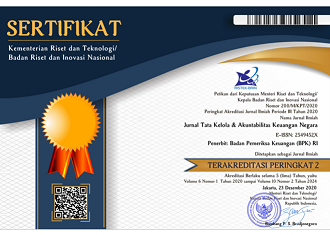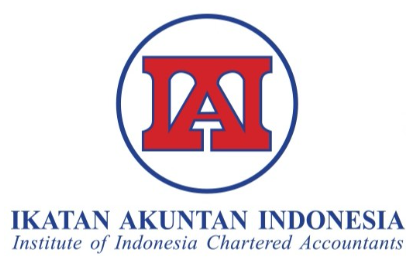Mapping of budget stress in Indonesia: Consequence on budget implementation
DOI:
https://doi.org/10.28986/jtaken.v7i1.542Keywords:
Budget stress, budget implementation, decentralization, APBDAbstract
The phenomenon of a budget deficit in local governments at the provincial, regency, and city levels shows that there is budget stress. Budget stress is a regional fiscal condition reflected in the lower revenue budget, while regional expenditure is getting higher. The consequence of budget stress is low budget implementation, and it reduces the quality of services to the public. This study aims to map the regions experiencing budget stress at the local government levels. Furthermore, this study examines and analyzes the consequences of budgetary stress on budget implementation. The research sample used local governments at the provincial, regency, city levels throughout Indonesia during 2016-2020. This study uses Ordinary Least Square (OLS) to test the research hypothesis. This study groups the five regions with the highest budget stress during 2016-2020. The results of this study can contribute to the theory, methodology, and implementation related to the budget. The theory's contribution is that the political budget cycle can maintain government performance through various efforts to reduce budget stress. This study also found that budget stress can reduce budget implementation. Therefore, the government needs to pay attention to indicators of budget stress.
References
Advisory Commission on Intergovernmental Relations (ACIR). (1973). City financial emergencies: The intergovernmental dimension. Washington DC: U.S. Government Printing Office.
Aldag, A. M., Kim, Y., & Warner, M. E. (2019). Austerity urbanism or pragmatic municipalism? Local government responses to fiscal stress in New York State. Environment & Planning A: Economy and Space, 51(6), 1-19. DOI: 10.1177/0308518X19844794
Anggraeni, R., & Kiswanto. (2018). The effect of the completeness of financial statements and fiscal stress on the human development index through the regional financial performance. Accounting Analysis Journal, 7(2), 6168.
Armawaddin, M., Syarif, M., & Bungin, V. S. (2020). Pengaruh SILPA dan fiscal stress terhadap belanja modal pada kabupaten/kota di provinsi Sulawesi Tenggara. Jurnal Ekonomi Pembangunan, 10(2), 478-489.
Arnett, S. B. (2011). Fiscal stress in the U.S. States: An analysis of measures and responses. (Unpublished doctoral dissertation). Georgia State University, USA.
Badrudin, R., & Siregar, B. (2015). The evaluation of the implementation of regional autonomy in Indonesia. Economics Journal of Emerging Markets, 7(1), 1-11. DOI: 10.20885/ejem.vol7.iss1.art1
Boukari, M., & Veiga, F. J. (2018). Disentangling political and institutional determinants of budget forecast errors: A comparative approach. Journal of Comparative Economics, 46(4), 1030 -1045. DOI: 10.1016/ j.jce.2018.03.002
Bruck, T., & Stephan, A. (2006). Do Eurozone countries cheat with their budget deficit forecast? Kyklos, 59(1), 315. DOI: 10.1111/j.14676435.2006.00317.x
Cooper, D. R., & Schindler, P. S. (2015). Business research methods (12 Edition). New York: McGraw-Hill Education.
Chapman, J. I. (1999). Local government autonomy and fiscal stress: The case of California countries. State and Local Government Review, 35(1), 15-25.
Fauzi, A. I. (2019, November, 27). Defisit Rp581 miliar, APBD Kota Tangerang 2020 ditambal Silpa. TangerangNews.com. Retrieved from https:// tangerangnews.com/kota-tangerang/ read/29319/Defisit-Rp581-MiliarAPBD-Kota-Tangerang-2020Ditambal-Silpa
Ghozali, I., & Ratmono, D. (2017). Analisis multivariate dan ekonometrika: Teori, konsep, dan aplikasi dengan Eviews 10. Semarang: Badan Penerbit Universitas Diponegoro.
Gorina, E., Maher, C., & Joffe, M. (2017). Local fiscal distress: Measurement and prediction, Public Budgeting and Finance, 38(1), 72-94. DOI: 10.1111/ pbaf.12165
Heinemann, F. (2006). Planning or propaganda? An evaluation of Germany’s medium-term budgetary planning. Public Financial Analysis, 62(4), 551578.
Hanif, I., & Suparno. (2017). Pengaruh waktu penetapan anggaran dan fiscal stress terhadap serapan anggaran pemerintah kabupaten/kota di provinsi Aceh. Jurnal Ilmiah Mahasiswa Ekonomi Akuntansi (JIMEKA), 2(4), 18-25.
Hariani, E., & Febriyastuti, F. (2020). The effect of fiscal stress, original local government revenue and capital expenditures on efficiency ratio of government independence performance. Jurnal Ekonomi dan Studi Pembangunan, 12(1), 18-25.
Hartono, J. (2013). Metodologi penelitian bisnis: Salah kaprah dan pengalaman-pengalaman (Edisi 6). Yogyakarta: BPFE Fakultas Ekonomika dan Bisnis UGM.
Hevesi, A. G. (2006). Analysis of fiscal stress in New York State’s cities. In local governmentissues in focus. New York: New York State Office of the State Comptroller. Retrieved from https://www.osc.state.ny.us/files/ local-government/publications/pdf/ citiesfiscalstress.pdf
Huda, A. S. (2015). Pengaruh kinerja keuangan, fiscal stress, dan kepadatan
penduduk terhadap alokasi belanja modal di Nusa Tenggara Barat. Jurnal Assets, 5(2), 1-12.
Kim, Y. (2017). Limits of property taxes and charges: City revenue structures after the great recession. Urban Affairs Review, 55(1). DOI: 10.1177/ 1078087417697199
Kusbiantoro, D. (2018, October 29). APBD 2019 Kabupaten Jember Defisit Rp351 Miliar. Antara Jatim. Retrieved from https:// jatim.antaranews.com/ berita/265757/apbd-2019-kabupaten -jember-defisit-rp351-miliar.
Law of The Republic of Indonesia Number 23 of 2014 concerning Local Government (Undang-Undang Republik Indonesia Nomor 23 Tahun 2014 tentang Pemerintah Daerah). Retrieved from https://peraturan.bpk.go.id/ Home/Details/38685/uu-no-23tahun-2014
Lhutfi, I., Ritchi, H., & Yudianto, I. (2020). Do the growth of original local government revenues and the growth of capital expenditure affect fiscal stress? Journal of Economics, Business, and Accountancy Ventura, 23 (1), 1-11.
Mahmudi. (2019). Analisis laporan keuangan pemerintah daerah (Edisi 4). Yogyakarta: UPP STIM YKPN
Mahsun, M. (2013). Pengukuran kinerja sektor publik (Edisi Pertama). Yogyakarta: BPFE.
Muryawan, S. M., & Sukarsa, M. (2016). Pengaruh desentralisasi fiskal, fiscal stress, dan kinerja keuangan daerah terhadap pertumbuhan ekonomi di kabupaten/kota provinsi Bali, EJurnal Ekonomi dan Bisnis Universitas Udayana, 5(2), 229-252.
Namlis, A. (2018). Dinamika implementasi penyelenggaran pemerintahan daerah. Jurnal Kajian Pemerintahan, 4 (1), 37-43. DOI: 10.25299/ jkp.2018.vol4(1).2167
Oliewo, M. (2015, June 21). Low absorption of funds makes nonsense of the budget trillions. Business Daily. Retrieved from www.businessdailyafrica.com/ analysis/nonsense-of-the-budget trillions/ 539548-2760040-kuxeadz/ index.html
Rakhman, F. (2019). Budget implementation in a risky environment: Evidence from the Indonesia public sector. Asian Review of Accounting, 27(2), 162-176. DOI: 10.1108/ARA-01-2018 -0020
Ratmono, D., & Sholihin, M. (2017). Akuntansi keuangan daerah berbasis akrual. Yogyakarta: UPP STIM YKPN.
Saragih, R. (2020, September 29). Defisit Ratusan Miliar, Pembangunan Jambi 2021 Terancam Mandek. Berita Satu. Retrieved from https:// www.beritasatu.com/ nasional/681687/defisit-ratusanmiliar-pembangunan-jambi-2021terancam-mandek.
Sari, I. P., Diana, N., & Junaidi. (2021). Pengaruh desentralisasi fiskal, fiskal stress, dan kinerja keuangan terhadap pertumbuhan ekonomi (studi empiris pada kota dan kabupaten di provinsi Jawa Timur). Jurnal Ilmiah Riset Akuntansi, 10(1), 108-120.
Shi, L., & Varuzzo, A. M. (2020). Surging seas, rising fiscal stress: Exploring municipal fiscal vulnerability to climate change. Cities, 100, 1-13. DOI: 10.1016/j.cities.2020.102658
Siregar, B. (2015). Akuntansi sektor publik: Akuntansi keuangan pemerintah daerah berbasis akrual) (Edisi Kedua). Yogyakarta: UPP STIM YKPN.
Winarno, W. W. (2015). Analisis ekonometrika dan statistika dengan Eviews. Yogyakarta: UPP STIM Yogyakarta.
Downloads
Submitted
Accepted
Published
How to Cite
Issue
Section
License

Jurnal Tata Kelola dan Akuntabilitas Keuangan Negara is licensed under
a Creative Commons Attribution-ShareAlike 4.0 International License




















